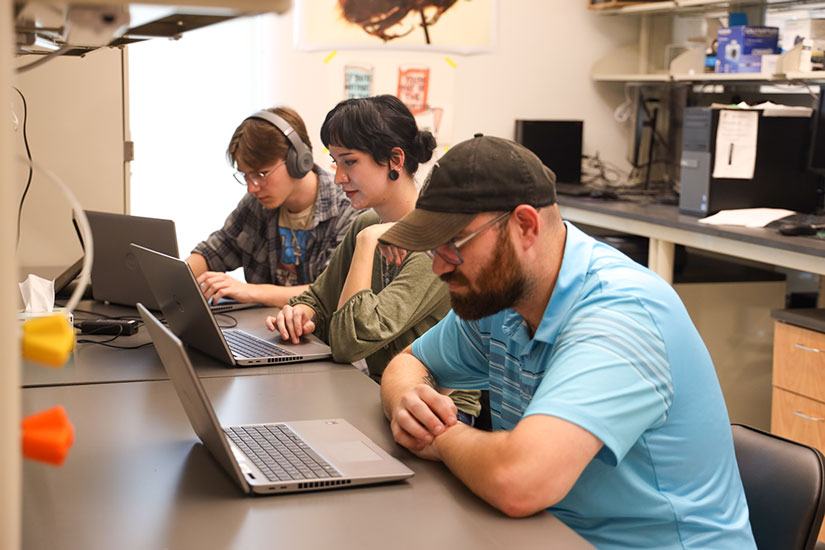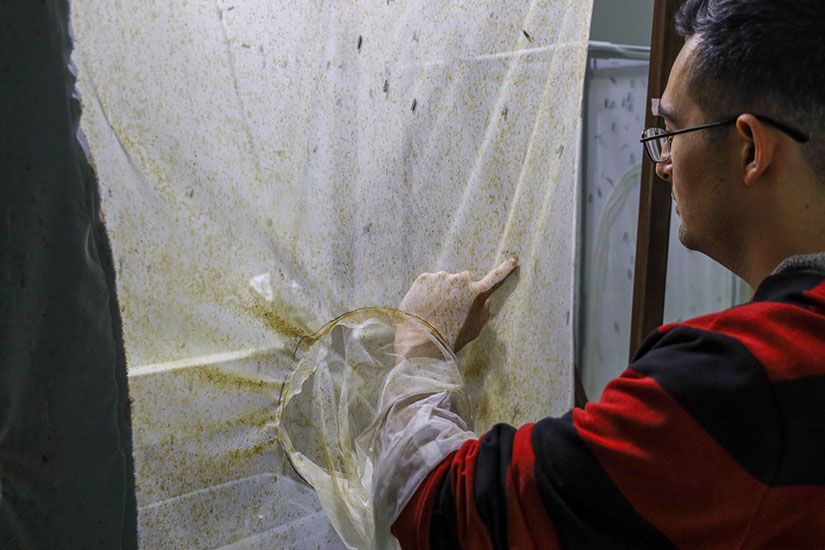For Jace Dickey, a biology major at Ivy Tech, this summer has been nothing short of a whirlwind. Earlier this spring, a friend tipped him about a full-time, paid research opportunity being offered at the School of Science at IU Indianapolis. In the months since, Dickey, along with two fellow Ivy Tech students, Charlie Schmidt and Sean Fischer, both set to attend the School of Science this fall, can explain topics never before anticipated. One’s that involve bugs, food and the future of society.
Members of a START internship, funded by the National Science Foundation (NSF) and its Industry-University Cooperative Research Centers (IUCRC) program, the trio earned their opportunity through Christine Picard, professor of biology and Associate Dean for Research and Graduate Education at the School of Science, and the Center for Environmental Sustainability through Insect Farming (CEIF).
Working in Picard’s lab, Dickey, Fischer and Schmidt have spent the summer learning about insects as food and feed for both humans and animals, bioinformatics, genomics and more. Though the thought of bugs as a vital food source for humans in the future hadn’t necessarily crossed any of the three’s minds before, it didn’t take long for them to get on board.

“I will never forget learning what the internship was about for the first time and immediately thinking, ‘Oh my, we're all eating bugs,’ but the more the more I've researched, the more I'm like, ‘Oh, we're eating bugs,’ in an exciting way,” Dickey said. “So, to be a part of research that is developing the methods in which we're going to use, hopefully in the future, to rear these insects to feed society, it’s awesome.”
The topic of research brought about a lot of excitement for Schmidt, a biology major who has a passion for environmentalism.
“Sustainability has always been of high interest to me, and part of what we're doing here, it's going to help the environment,” she said. “I went into biology because I want to do anything that makes positive impact on the world. So doing this research, it’s been incredible. I'm really getting a taste for what my career is going to look like.”
Most surprising to the trio was the heavy use of bioinformatics in Picard’s research, a skill in which all had not previously taken up but has been the emphasis of their work this summer. Running complex programs built around genetic data, solving problems isn’t always easy, nor quick, but for Fischer, getting positive results is well worth the work.
“I’ve enjoyed the computer science side of things the most, like doing the programming,” Fischer said. “It’s so validating to run a program and it works and you feel like you're getting somewhere. It’s a great feeling.”
To culminate their experience, Dickey, Fischer and Schmidt will take a trip to North Carolina in November to present their work at the CEIF Fall Meeting, where they’ll get to network and interact with various researchers, faculty and graduate students in the field, many of which they’ve studied over the months.
What’s encouraged Picard is how far the three have come over the summer. From the first meeting, which she compared to a deer in the headlight moment, to now, where they’re solving problems and running scripts with less help from their graduate mentors.
Fortunately for future students, Picard will be offering the same opportunity in the summer of 2025. Though, the experience is so impactful, she wishes she could have funding for the internship every summer.

“I think having that immersive, full-time experience, while getting paid very well, is important because oftentimes undergraduates are doing research during the semesters, where their time is limited,” she said. “Getting that heavy dose all at once, I think it's going to set them up -- especially at this stage where they're in their second, third year, so early on -- to continue to build that research infrastructure. I’m extremely impressed with what they’ve been able to do.”
As for Dickey, as well as Fischer and Schmidt, they’re grateful to have had this special opportunity to dive headfirst into full-time research, gaining valuable experience along the way.
“Just to be a small, small part of that process of changing the world, in a way, is awesome,” Dickey said. “I couldn't have asked for a cooler opportunity to be part of.”